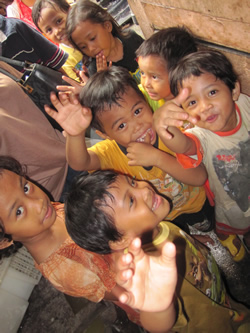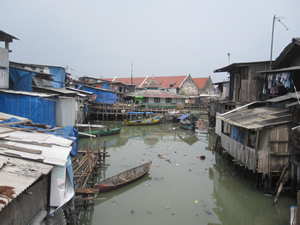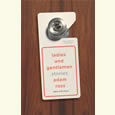On Happiness and the Thematic Resonance of Pigeon Racing
On this Indonesian slum tour, an American novelist discovers more than he expected
In the four feet between the train tracks and the wall that separates those tracks from the rest of Jakarta, people are living. North and southbound tracks with lean-tos on either side. In between the two sets of tracks, kids play soccer. A trash fire burns where a goal might be.
I stand at the open end of one of the lean-tos looking in on what used to be a man. Knees and ribcage and stillness.
He’s dead, I think, and almost laugh. Shame follows next. Then disbelief. Maybe the near-laugh has something to do with my inability to process what I’m seeing. I wonder whether it’s somehow a condition of the modern world that the correct emotion rarely surfaces.
A twitch. The man rolls over from side to back and puts his eyes on me: a writer doing research, a tall, well-fed American witnessing, as part of a tour, what may be his last hours.
Ronny, one of the Indonesians who run the slum tours, has been called over here by the man’s wife, a dusty, knobby old woman squatting next to her husband so close their toes are touching. The wife and Ronny are speaking in Indonesian, so all I pick up on is tone. Calm. Serious. They seem to be debating the best course of action. Ronny pays the medical bills for the people who live here with the money he makes from the tours, but the woman doesn’t want to trouble him. He has to talk her into it.
 Now we’re going to see the doctor, but the trip keeps getting delayed. First off, there are all the kids, a parade of kids who have paused their soccer game and are hopping up and down, greeting me by grabbing my hand and pressing it to their foreheads. A naked boy performs a show of balancing a paper cup on his forehead. A thin-armed girl who’s stolen the soccer ball is looking for somewhere to hide it. And Ronny is giving me statistics. How the Indonesian government says there are only nine million people in Jakarta, but really it’s closer to twenty-five. “So many uncounted,” he says. “Dis-counted.”
Now we’re going to see the doctor, but the trip keeps getting delayed. First off, there are all the kids, a parade of kids who have paused their soccer game and are hopping up and down, greeting me by grabbing my hand and pressing it to their foreheads. A naked boy performs a show of balancing a paper cup on his forehead. A thin-armed girl who’s stolen the soccer ball is looking for somewhere to hide it. And Ronny is giving me statistics. How the Indonesian government says there are only nine million people in Jakarta, but really it’s closer to twenty-five. “So many uncounted,” he says. “Dis-counted.”
And I say, “OK, but what about the doctor?”
“We are going to the doctor. Don’t worry about the doctor.”
I try not to. I decide to change the subject. “Don’t you do three or four of these tours a week?”
“Yes.”
“But the kids are so excited. Are they always like this?”
“They’re always like this,” he says. And then invites me into the house of a woman who’s been hit by the train. Houses, I keep wanting to call them, because they’re built with such integrity. This one has a wooden bureau cut down to size and part of a bookshelf, too.
The woman herself is tiny, shrunken from age and hard living. A bandage covers half her head and one of her eyes. But there is kindness enough in the other one. I say hello in my limited Indonesian. And she gives me a smile of such warmth it’s as though she’s been expecting me all day. Then the train comes.
Ka-chonk, ka-tink, ka-chonk, ka-tink, ka-chonk, ka-tink. Six inches from the open airway that is her front door. The woman still smiles, but there’s something behind it. There has to be something behind it.
“OK,” Ronny says once the train passes, “time to go”—not, as it turns out, because of a rush for the doctor, but because he wants to show me the pigeon races. I’d read about them before coming to Jakarta. The males speed along four kilometers to get to their lifelong mates. And boys in the crowd will hold out other female pigeons to try to get the males to stray.
The pigeon races are going to be a scene in the novel I’ve come to Jakarta to research. Thematic resonance is what I’ve told Ronny. It took me half an hour to explain. His English isn’t perfect, but I don’t think that was really the problem. It was more that he just didn’t see the point.
“Your book is about the poor in Jakarta?” he finally asked.
“No.”
“What is it about?”
“Americans. Two Americans in Indonesia.”
“There are a lot of books about Americans.”
“Yeah,” I had to admit. “Yeah, there are.”
Still, like many Indonesians, he’s immensely accommodating. Determined to give me a good tour, even if it means taking longer to get the doctor for a dying man.
 The races take place between the two sets of tracks only a few hundred yards north of where the boys play soccer. But there is no race today. And as we talk to the men, it becomes clear that this isn’t quite the style of pigeon racing I’d read about anyway.
The races take place between the two sets of tracks only a few hundred yards north of where the boys play soccer. But there is no race today. And as we talk to the men, it becomes clear that this isn’t quite the style of pigeon racing I’d read about anyway.
They ask where I’m from and nod deeply when I tell them, as if I’d just said something highly philosophical. One man is shaking Ronny’s hand and slapping his own belly in a joke I don’t understand. The kids are still hopping up and down. The wife looks on, waiting for the doctor but patient in a way I can’t relate to. And then it occurs all at once that somehow these people living next to the train tracks are happier than all my friends in the U.S., happier than anyone I know.
I’m not very comfortable with this thought. I don’t know what to do with it. It seems to delegitimize the work of someone like Ronny, someone committed to help. And then, too, you sometimes hear similar sentiments expressed by rich people who want to maintain the status quo.
Ronny gets a teenager to take the wife along to the doctor, and we continue along on our tour. We get in a cab and go to a place where refugees have built a village out of driftwood, a village that floats over the water like some miracle, a minor Venice.
I leave that tour touched and jittery. Something deeply mysterious about human nature and perseverance has gotten to me, and I want to tell everyone I can.
One guy, an Indonesian businessman I know from the bars, he says it’s bullshit. “Conscience tours,” he calls them. What happens, he reasons, if you own a piece of land and people come in there and decide to live on it? And you’ve been planning to develop that land, so now you look like you’re some kind of villain because you have to force them out? What happens when no one wants to take the train, because it goes by these places? Or if it hits someone and they blame the train company? And if these people couldn’t get by in Jakarta, if they needed charity, why were they here? Why did they come?
I’d never thought about it this way. And I don’t want to act like I know who’s right. I don’t know a whole lot about history or business or politics—or even, really, Indonesia. I just study fiction, which means, I guess, that at the very best, I know a few things about character. All I can really say for sure is this: that guy talking to me, that businessman on the diatribe, he is one of the loneliest, most unhappy people I’ve ever known.
Copyright (c) 2011 by Adam Prince. All rights reserved. Adam Prince is a Ph.D. candidate in English with a creative-writing emphasis at the University of Tennessee in Knoxville. His stories have appeared in The Missouri Review, The Southern Review, and Narrative Magazine among others. His first book, a short-story collection called The Beautiful Wishes of Ugly Men is forthcoming in May from Black Lawrence Press.


